Related Research Articles
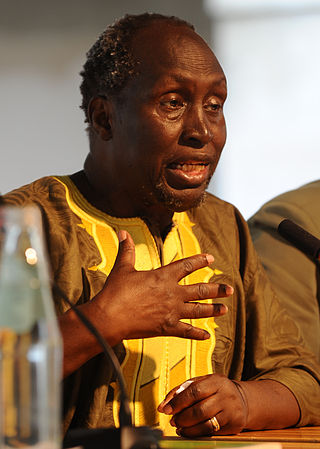
Ngũgĩ wa Thiong'o is a Kenyan author and academic who writes primarily in Gikuyu and who formerly wrote in English. He has been described as having been "considered East Africa’s leading novelist". His work includes novels, plays, short stories, and essays, ranging from literary and social criticism to children's literature. He is the founder and editor of the Gikuyu-language journal Mũtĩiri. His short story The Upright Revolution: Or Why Humans Walk Upright, is translated into 100 languages from around the world.

Juba is the capital and largest city of South Sudan. The city is situated on the White Nile and also serves as the capital of the Central Equatoria State. It is the world's newest capital city to be elevated as such, and had a population of 525,953 in 2017. It has an area of 52 km2 (20 sq mi), with the metropolitan area covering 336 km2 (130 sq mi).
In June 1962 a conference of African literature in the English language, the first African Writers Conference, was held at Makerere University College in Kampala, Uganda. Officially called a "Conference of African Writers of English Expression", it was sponsored by the Congress for Cultural Freedom and the Mbari Club in association with the Department of Extra-Mural Studies of Makerere, whose director was Gerald Moore.

Peter Nazareth is a Ugandan-born literary critic and writer of fiction and drama.

Mũkoma wa Ngũgĩ is a Kenyan American poet, author, and academic. He is associate professor of literatures in English at Cornell University and co-founder of the Safal-Cornell Kiswahili Prize for African Writing. His father is the author Ngũgĩ wa Thiong'o. His family was deeply impacted by the bloody British suppression of the Mau Mau revolution.
African literature is literature from Africa, either oral ("orature") or written in African and Afro-Asiatic languages. Examples of pre-colonial African literature can be traced back to at least the fourth century AD. The best-known is the Kebra Negast, or "Book of Kings."
Sudanese literature consists of both oral as well as written works of fiction and nonfiction that were created during the cultural history of today's Republic of the Sudan. This includes the territory of what was once Anglo-Egyptian Sudan, the independent country's history since 1956 as well as its changing geographical scope in the 21st century.
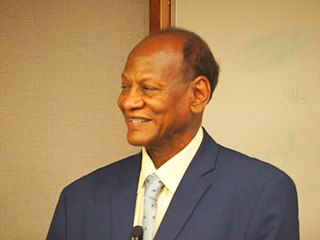
Bushra Elfadil is a Sudanese writer, living in Saudi Arabia. He has published several collections of short stories and novels in Arabic, with some of his stories translated into English, for example as part of anthologies of contemporary fiction from Sudan. In 2017, he was awarded the Caine Prize for African Writing.

Kenyan literature describes literature which comes from Kenya. Kenya has a long oral and written literary tradition, primarily in English and Swahili, the two official languages of the country.
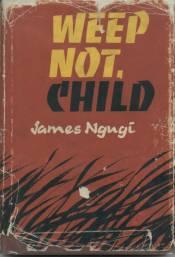
Weep Not, Child is a 1964 novel by Kenyan author Ngũgĩ wa Thiong'o. It was his first novel, published in 1964 under the name James Ngugi. It was among the African Writers Series. It was the first English language|English novel to be published by an East African. Thiong'o's works deal with the relationship between Africans and white settlers in colonial Kenya, and are heavily critical of colonial rule. Specifically, Weep Not, Child deals with the Mau Mau Uprising, and "the bewildering dispossession of an entire people from their ancestral land." Ngũgĩ wrote the novel while he was a student at Makerere University.

The culture of South Sudan encompasses the religions, languages, ethnic groups, foods, and other traditions of peoples of the modern state of South Sudan, as well as of the inhabitants of the historical regions of southern Sudan.
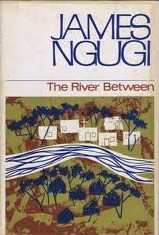
The River Between is a 1965 novel by prolific Kenyan author Ngũgĩ wa Thiong'o that was published as part of the influential Heinemann African Writers Series. It tells the story of the separation of two neighbouring villages of Kenya caused by differences in faith set in the decades of roughly the early 20th century. The bitterness between them caused much hatred between the adults of each side. The story tells about the struggle of a young leader, Waiyaki, to unite the two villages of Kameno and Makuyu through sacrifice and pain.
The Black Hermit was the first play by the Kenyan author Ngũgĩ wa Thiongʼo, and the first published East African play in English. The travelling theatre of Makerere College was the first to produce the play, putting it on in honour of Ugandan independence at the Ugandan National Theatre in Kampala in November 1962. The play was published in a small edition by Makerere University Press in 1963, and republished in the Heinemann African Writers Series in 1968.
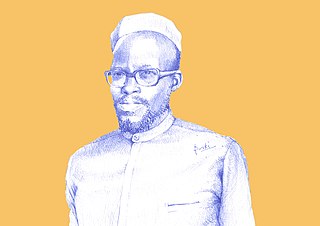
Pio Zirimu was a Ugandan linguist, scholar and literary theorist. He is credited with coining the word "orature" as an alternative to the self-contradictory term, "oral literature" used to refer to the non-written expressive African traditions. Zirimu was also central in reforming the literature syllabus at Makerere University to focus on African literature and culture instead of the English canon.

Decolonising the Mind: the Politics of Language in African Literature, by the Kenyan novelist and post-colonial theorist Ngũgĩ wa Thiong'o, is a collection of essays about language and its constructive role in national culture, history, and identity. The book, which advocates linguistic decolonization, is one of Ngũgĩ's best-known and most-cited non-fiction publications, helping to cement him as a preeminent voice theorizing the "language debate" in post-colonial studies.
Abdelaziz Baraka Sakin is a Sudanese fiction writer with roots in Darfur in western Sudan, whose literary work was banned in Sudan in 2011. Since 2012, he has lived in exile in Austria. He is mostly known for his novels The Messiah of Darfur and The Jungo, translated from the original Arabic into French, English, Spanish and German.
Busara was a literary journal published quarterly by the East African Publishing House, and later biannually, by the English Department at the University of Nairobi. It was first published under that name in 1968, and became one of the most influential literary journals of its time in Kenya. Jared Angira became its editor in chief in 1969.
Wanjikũ wa Ngũgĩ is a Kenyan writer, who has lived and worked in Eritrea, Zimbabwe and Finland. She is the founder and former director of the Helsinki African Film Festival (HAFF). Also a political analyst, she is a member of the editorial board of Matatu: Journal for African Literature and Culture and Society, and has been a columnist for the Finnish development magazine Maailman Kuvalehti. Among journals and newspapers in which her work has appeared are The Herald (Zimbabwe), The Daily Nation, Business Daily, Pambazuka News and Chimurenga. She is the author of a novel published in 2014 and a contributor to anthologies including New Daughters of Africa: An International Anthology of Writing by Women of African Descent, Nairobi Noir.
Adil Babikir is a Sudanese literary critic and translator into and out of English and Arabic. He has translated several novels, short stories and poems by renowned Sudanese writers and edited the anthology Modern Sudanese Poetry. He lives and works in Abu Dhabi, United Arab Emirates.
References
- ↑ Encyclopædia Britannica, biography
- 1 2 "Taban lo Liyong | South Sudanese and Ugandan writer". Encyclopedia Britannica. Retrieved 28 June 2020.
- ↑ Brydon, Diana (2015). "Ngugi wa Thiong'o "On the Abolition of the English Department" (1972)". ESC: English Studies in Canada. 41 (4): 3. doi:10.1353/esc.2015.0074. hdl: 1993/32305 . ISSN 1913-4835. S2CID 163900212.
- ↑ Richard J. Reid. A History of Modern Uganda. Cambridge University Press: Cambridge, 2017. p. 42
- ↑ Obi-Young, Otosirieze (14 February 2020). "Professor Taban Lo Liyong Suspended by University of Juba Over Open Letter on South Sudanese States' Boundaries". Brittle Paper . Retrieved 6 August 2022.
- ↑ "Statement by the African Studies Association (US) concerning the recent suspension of Professor Taban Lo Liyong from the University of Juba". African Studies Association Portal - ASA - ASA. 5 March 2020. Retrieved 28 June 2020.
- ↑ Shringarpure, Bhakti et al. (2016), Literary Sudans: An Anthology of Literature from Sudan and South Sudan. Trenton: The Red Sea Press, pp. 4–6.